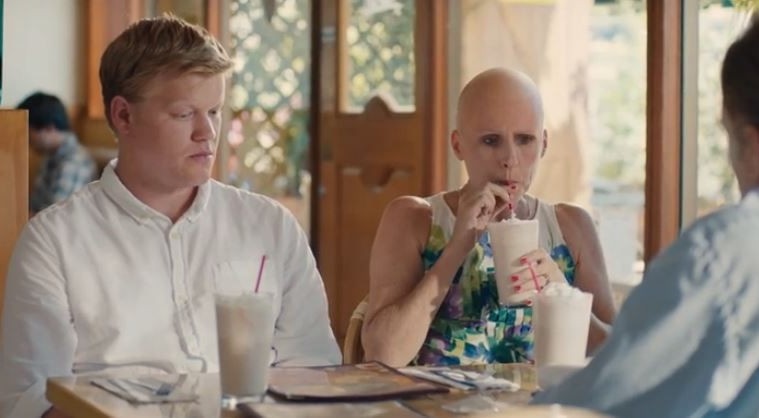Combining a cancer narrative with that of an anxious gay man whose family never reconciled with him could easily make for too much emotional baggage for one film to handle. Kelly portrays both with enough specificity that he could've likely gotten two films out of Other People. It demystifies sickness in a no-frills way, taking a page from films like 50/50 and James White. Kelly also ably constructs the family member who keeps everyone at arm's length, engaging in niceties but never letting the guard all the way down. David is someone who has created nonoverlapping magisteria in his life, with his family in one constrained circle and friends, work, and romance in others. Joanne is the only one allowed to mix worlds. There's a wealth of perception and hard-earned wisdom in Other People, ensuring that the viewer is always engaged mentally on a constant flow of lived-in moments.
Other People has no problem engaging emotionally. David losing his strongest familial connection combined with Joanne's harrowing deterioration keeps lumps firmly in throats. Joanne's parents, played by June Squibb and Paul Dooley, are a break in the conversation away from breaking down no matter how frank and jovial they were being moments before. Acquaintances can be having lovely conversations with Joanne and David, and she nonchalantly mentions that she's not doing chemo anymore, causing a wave of unspoken emotions in the acquaintance as their mind figures out what that means and the reaction subtly materializes in the corners of their eyes. Any scene, no matter how bouncy or cheerful it seems to be going, can believably transition to tears at a moment's notice.
Like another great downer of 2016, Manchester By the Sea, Other People never forgets to find the humor in sad situations. A lot of this is due to Shannon's superlative performance, a complementary role to her performance in Me and Earl and the Dying Girl, where she was the mother of a cancer patient. Here, she's completely unashamed of her illness, punctuating sentences by theatrically ripping off her wig. She speaks plainly about what her husband (Bradley Whitford) should do after she dies, and what she wants done with her corpse. She does nail the rock-bottom scenes of despair and misery that the film uses sparingly, but she's first and foremost a sassy and big-hearted broad who just happens to have a large and growing mass on her back. David and Gabe also have a witty rapport based on decades of shared history. The one part of Other People that pushes too far into pure comedy is Gabe's pre-teen brother (JJ Totah), who gives a Gaga-esque drag performance at a family gathering. This might be another too-specific-to-be-concocted scenario like the aforementioned answering machine scene, but it's an odd inclusion in a film that was successfully finding humor in dialogue.
What's amazing is that Kelly had an experience superficially identical to many other people, but he manages to tell a story about those experiences that is totally free of cliche and unearned emotion. He doesn't take any shortcuts that surely presented themselves in the course of making the film, instead sticking with the least-writerly and probably truest interpretation of events. Other People is my ideal mixture of pathos and levity, see-sawing back and forth freely between those two opposites. B+

 RSS Feed
RSS Feed